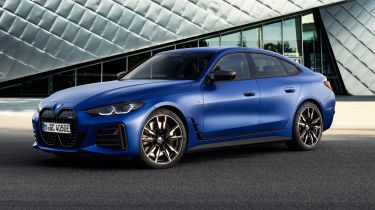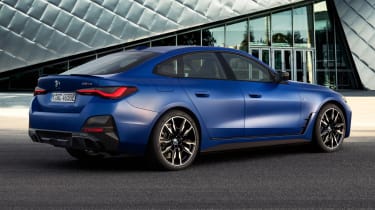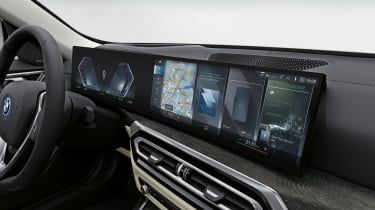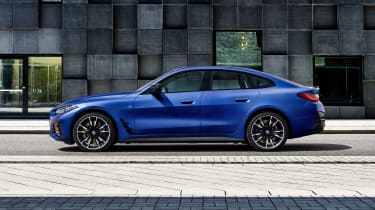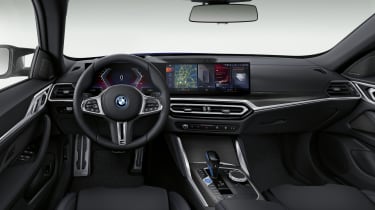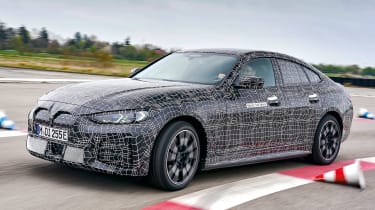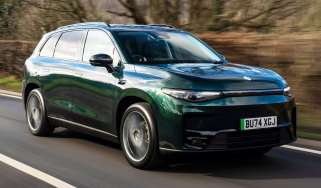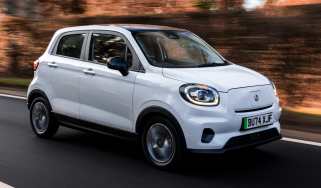New 2021 BMW i4 M50 prototype driven
New electric BMW i4 will rival Tesla Model 3 and claims official range of 367 miles
- eDrive40 variant capable of 367-mile range
- Sport, M Sport and standalone M50 trim levels available
- i4 line-up starts from £51,095
The BMW i4 has been officially unveiled. The new electric four-door coupe is the fourth pure-electric model in the brand’s line-up after the i3, iX3 and iX, and is similar in size to the BMW 3 Series, but with sleeker styling.
BMW’s electric saloon will launch in two versions: an eDrive40 and a flagship i4 M50 performance model. It’ll be on sale in the UK shortly, with prices starting from £51,905. Given its saloon layout and electric powertrain, the 2021 BMW i4 will be a direct rival for the Tesla Model 3 and Polestar 2.
 The 10 best electric cars in 2025
The 10 best electric cars in 2025
We’ve already driven a prototype of the new i4 to see how it's shaping up, and our first impressions were very positive. Read on for our prototype review and everything we know about the i4 so far.
2021 BMW i4: powertrain, charging and performance
The i4 features the fifth-generation of BMW’s eDrive electric motor technology and an 81kW (usable capacity) battery across the line-up. The rear-wheel drive eDrive40 is the entry point to the range, and is powered by a single motor mounted on the rear axle. This setup produces 335bhp, which gives the base model rapid performance; sprinting from 0-62mph in 5.7 seconds with a top speed of 118mph.
Claimed range for the eDrive40 is an impressive 367 miles, a figure that puts the i4 into direct competition with the Tesla Model 3 Long Range, which is capable of up to 360 miles at the time of writing.
Above this the more powerful M50, which gets a dual motor powertrain, with one motor mounted on each of the front and rear axles, for all-wheel drive. Total power is increased to 537bhp, meaning the M50 manages 0-62mph in 3.9 seconds and a top speed of 140mph. Due to the power hike and the added weight of the second motor, claimed range is pegged back to 316 miles.
Every version of the i4 features BMW's latest charging technology, supporting rapid charging at up to 200kW. When connected to a rapid charger, the i4's battery can be topped up to 80% in around 31 minutes.
While buyers will only be able to spec the 81kW battery at launch, sources within BMW have hinted the i4 range could be expanded with smaller battery models. These would offer less range, but with a significant cost saving.
BMW says that despite both versions of the i4 offering competitive range figures, they will be as good to drive as a 3 Series or a 5 Series. To achieve this, the i4 gets wider axles than the 3 Series, and BMW claims the car’s chassis rigidity, weight distribution and sharp steering make it engaging to drive and a capable long-distance cruiser.
The eDrive50 features rear air suspension, while the M50 gets a specific adaptive M suspension setup. All versions are fitted with a new dynamic stability control system that is ten times faster to respond than a regular setup. Other performance features include a launch control system, and a traction control system that can be disengaged completely, allowing the car to perform power slides. Additionally, the M50 variant’s xDrive four-wheel drive system is rear-biased, pushing more of the power to the rear wheels.
Prices, trim levels and specifications
The entry-point to the i4 line-up is the eDrive40 which can be specced in both Sport and M Sport trims. Prices start from £51,905 for the Sport spec car, which gets 18-inch aerodynamic alloy wheels, gloss black exterior trim and electrically folding wing mirrors.
Inside, standard equipment includes an auto dimming rear-view mirror, automatic air conditioning and heated front seats. BMW’s Live Cockpit Professional is also standard, alongside a 12.3-inch digital dial cluster and a 14.9-inch infotainment system which merge together to form one large display.
M Sport trim starts from £53,405, adding a new set of 18-inch alloys, an M Sport leather trimmed steering wheel and the Driving Assistant pack. It also gets sportier M Sport exterior styling, aluminum interior trim and Alcantara Sensatec upholstery.
The top spec M50 commands a starting price of £63,905, adding 19-inch alloys and an M Sport bodykit to the standard equipment. Inside, black leather trimmed seats with electric adjustment and a memory function are fitted, along with rear privacy glass, wireless phone charging and a head-up display.
Design
The i4’s headlights and distinctive kidney grilles are carried over from the 4 Series, with the brake light clusters and the tailgate getting a similar design. Compared to the 3 Series, the i4 gets a more steeply raked rear windscreen and rear-quarter windows.
In Sport trim, its electric powertrain is highlighted by blue accents on the grilles, side skirts and rear diffuser, and the front grilles are blanked out to improve aerodynamic efficiency. The alloy wheels on this car look to have been designed with aerodynamics in mind, too.
In M Sport and M50 specification, the i4 gets a more aggressive design with silver trim surrounding the front grilles, front air intakes, side skirts and rear diffuser. A smattering of ‘M’ badges also feature on every side of the car, along with a rear lip spoiler on the boot lid. Larger two-tone finish alloy wheels complete the sporty makeover.
Interior, technology and practicality
The inside of the i4 looks familiar when compared to current BMW models, but boasts a significant technology upgrade with a vast curved display sitting atop the dashboard. This display merges a 12.3-inch digital dial cluster with a 14.9-inch central infotainment screen, and runs the brand’s latest iDrive 8 software. It can be operated via the main touchscreen, or with the rotary wheel located in the centre console.
The remainder of the interior borrows design cues from the current 3 Series and 5 Series range, with a wraparound dashboard that angles all of the central controls towards the driver. Hexagonal air vents are dotted across the dashboard, along with a physical control panel in the centre. Beneath this the centre console houses a conventional gear stick, and a row of physical buttons to adjust the car’s modes and setup.
While the i4’s interior dimensions have not yet been confirmed, it does measure in at 4,785mm long, meaning the slim lithium-ion floor mounted battery should make it spacious enough for four adult passengers. While there's no ‘frunk’ or front boot, rear storage space is excellent, with a 470-litre boot.
iDrive 8 infotainment
BMW has highlighted the level of personalisation you can expect in the new iDrive system, which allows you to change the ambient lighting colour, the weight of the steering and even the graphics on the screen. There are several layouts for the touchscreen, including a ‘Focus’ mode for “extremely dynamic driving situations”. There's also a new voice activated personal assistant, that can be renamed to anything you want to call it. All the settings you change can be assigned to a driver profile, so your individual preferences come into effect when you get in.
The navigation system ‘learns’ your frequent journeys - like a daily commute - and can preemptively load up directions and traffic info. Software updates happen over-the-air, and the car will ‘wake up’ when you’re three metres away if it senses you’re approaching.
2021 BMW i4 M50 prototype drive by Alexander Bernt
The mid-sized saloon remains a popular buy with BMW’s traditional customer base, so the addition of the pure-electric i4 gives the brand a tempting option to convince buyers to switch to zero-emissions motoring. After a short test drive of an i4 M50 prototype though, it’s clear that irrespective of the powertrain switch; this is an electric car that caters for the driving enthusiast.
And before the EV naysayers chime in, the i4’s two-tonne weight has a minimal impact on its handling dynamics, with an ultra-low centre of gravity meaning there’s relatively little body roll in corners. The integration of the battery into the i4’s chassis makes it a structural component, improving the car's rigidity, and enhancing the car’s dynamics for a secure and balanced feel. The steering is also very precise, resulting in a natural composure to the handling.
While the i4 falls short of the current M3 for overall driving dynamics, there is little doubt that this one of the best driving electric cars we’ve tested to date.
In addition to the excellent dynamics, the i4 is also very competent as an electric car. The intelligent braking recuperation, which channels energy back into the battery as you brake, monitors your location via the sat nav and automatically adjusts the level of regeneration depending on the road ahead. This helps the system fade into the background as you drive. The driver can also adjust the setup manually via the drive selector, if they want to take full control.
Part of the appeal of the i4 will be it's design, which is fairly conventional for an EV. While it does feature several design elements to help reduce drag and maximise range, it does bear a familiar design that is easily relatable to the current 4 Series and 3 Series models. Inside, this straightforward approach continues with a conventional looking interior, providing a welcome balance between touchscreen controls alongside simple to operate physical switches and rotary dials.
What does it mean for car buyers?
When it goes on sale later this year, the all-electric BMW i4 will be a direct rival to the Tesla Model 3 and a genuine electric alternative to conventionally powered versions of the 3 Series. It looks set to match the Model 3 for technology and range, which should be enough for most owners. Add to this BMW’s reputation for producing great driver’s cars, plus the premium badge, and the i4 could well be a tempting alternative to the Model 3 for buyers that want to make the switch to electric.
Want to know more about BMW’s electrified model range? Check out our reviews of the BMW 330e, BMW X5 xDrive45e and BMW i3.
Recommended
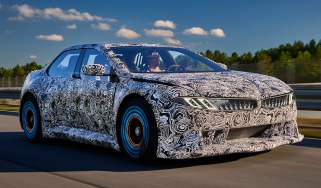
New BMW M3 super-saloon goes electric – we ride in a prototype
Most Popular
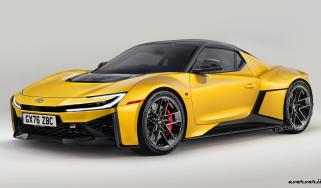
New Toyota MR2 sports car on the way – and it’s not electric!
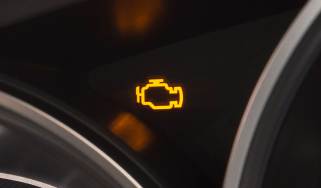
Engine management light: what to do if it comes on
Tips & advice

Car dashboard warning lights: what does each symbol mean?

Electric car charging stations: public networks, charger types, apps and maps


